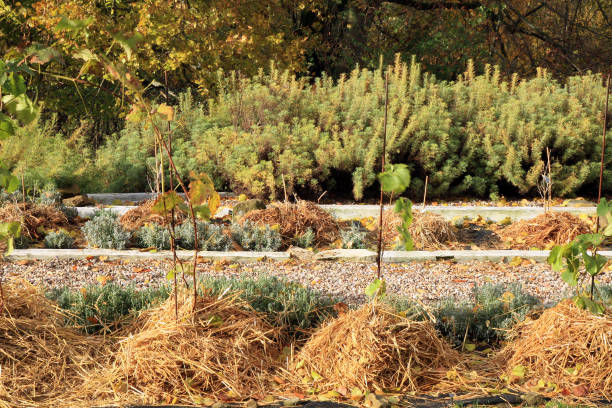Overwinter instructions on how to plant correctly and protect them from snow and frost in winter. When the gardening year is slowly coming to an end, you should ensure your plants have adequate winter protection in good time. This is especially true when exotic plants are overwintered, but outdoor plants also need protection from the cold weather.
Winter protection for various plants
Since different plants have different needs, you should also keep this in mind when wintering. As a result, some potted plants overwinter better than others. Here you have to pay attention to the foliage. Because plants with harder leaves and faster woody shoots are easier to overwinter than those with soft leaves and rather fast-growing, herbaceous shoots. Accordingly, the following plants have hard foliage:

- oleander
- laurel
- strawberry tree
These plants do not grow as fast and are therefore not as sensitive to overwintering. The hard-leaved, slow-growing varieties tolerate darker cellar rooms in winter but must be watered regularly during the winter months, as they must not dry out. It is therefore advisable to supply these plants with water every fourteen days in the winter quarters. You can immediately check the plants for pest infestation. The following plants, for example, have soft foliage:
- daisies
- fuchsias
- geraniums
Cassia and gentian trees
These varieties grow much faster and are demanding when overwintering. The plants not only need dry, lighter rooms to overwinter, but they also need the right temperature. Tropical plants like it moist and warm and are in good hands in the heated conservatory. On the other hand, the daisy trees feel most comfortable at temperatures of two to eight degrees Celsius.
1) Tips for overwintering potted plants
After gardening in the fall, it’s straight on to winterizing the garden. Whether the foliage is soft or hard, there are some care tips that are important for trouble-free winter protection for plants. If you heed these, then it will also work with the wintering of your plants:
- Water potted plants regularly, but little.
- Do not overwinter cold-sensitive plants on drafty or cold window sills.
- Ventilate the winter quarters when the temperatures are mild.
- Water and fertilize more again from February.
2) Packing or piling up roses
Proper care of roses is especially important in winter. Because with the rose trunk, the crown and the grafting point are particularly at risk. That’s why they are packed and airy. Straw, styrofoam, or wood wool are suitable as insulation. Fleece or spruce branches can be used for packing. Native roses, i.e. all hybrid tea roses, can be kept healthy through the winter with loose soil. They are accumulated in the fall. Compost is a good choice, as it improves the soil and supplies it with nutrients. This is the perfect winter protection for plants.
3) Jute bags as winter protection for plants
Always secure jute or fleece bags that are placed over the plants with a ribbon. Otherwise, strong winds can blow away the winter protection for plants. Winter protection is available in a wide variety of sizes, colors, and shapes. Just in time for Christmas, the plants are packed in fleece or jute bags with reindeer or Santa Claus motifs and this gives the garden, balcony, or terrace a few pretty color accents that drive away the gray of winter. Also, note tips for growing plants with a breeding mat.
4) Overwinter exotic aquatic plants

While Stratiotes submerge and water lilies overwinter in the frost-free pond bottom, water hyacinths, water ferns and other aquatic plants that are at risk of frost must be fished off and kept in a water basin indoors. If you don’t winterize perennials, grasses, and ferns, the damage will become apparent once the snowpack melts. While a closed blanket of snow offers the best frost protection for herbaceous plants, cold frost often has dire consequences. Spruce branches or straw mats help against this. This can also be used to prevent early bloomers and bulbous plants from sprouting early. Therefore, it makes sense to have the right equipment ready for gardening.
5) Tips on winter protection for exotic plants
Extraordinary flowers that do not grow in the home garden are often referred to as exotic plants. Exotic plants that come from the tropics and subtropics can often only be grown in our greenhouse. In summer, caring for these plants is not a problem. But winter is more of a challenge. Because they need a certain environment for a successful hibernation. But very few garden owners have a greenhouse or an orangery. In the following, we will show you how exotic friends can still hibernate successfully.
